
Vittorio De Sica was an Italian film director and actor, a leading figure in the neorealist movement.

Seven Beauties is a 1975 historical black comedy drama Italian film written and directed by Lina Wertmüller and starring Giancarlo Giannini, Fernando Rey, and Shirley Stoler.
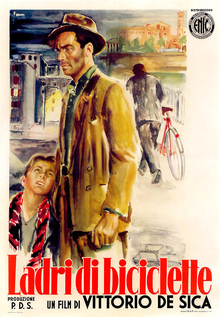
Bicycle Thieves, also known as The Bicycle Thief, is a 1948 Italian neorealist drama film directed by Vittorio De Sica. It follows the story of a poor father searching in post-World War II Rome for his stolen bicycle, without which he will lose the job which was to be the salvation of his young family.

The Star Maker is a 1995 Italian film. It was produced by Rita Cecchi Gori, Vittorio Cecchi Gori, directed by Giuseppe Tornatore, while the title role was played by Sergio Castellitto. It won the Grand Jury Prize at the Venice Film Festival. It was nominated for the Academy Award for Best Foreign Language Film.
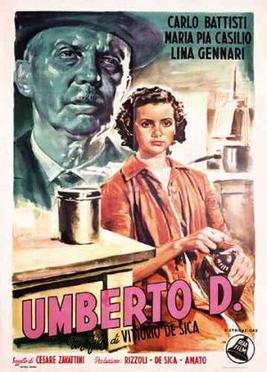
Umberto D. is a 1952 Italian neorealist film directed by Vittorio De Sica. Most of the actors were non-professional, including Carlo Battisti who plays the title role of Umberto Domenico Ferrari, a poor elderly man in Rome who is desperately trying to keep his rented room. His landlady is evicting him and his only true friends, the housemaid and his dog Flike are of no help.
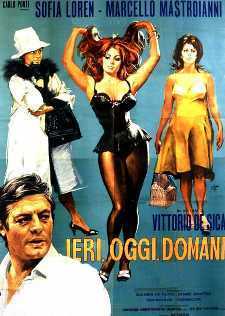
Yesterday, Today and Tomorrow is a 1963 comedy anthology film by Italian director Vittorio De Sica. It stars Sophia Loren and Marcello Mastroianni. The film consists of three short stories about couples in different parts of Italy. The film won the Academy Award for Best Foreign Language Film at the 37th Academy Awards.
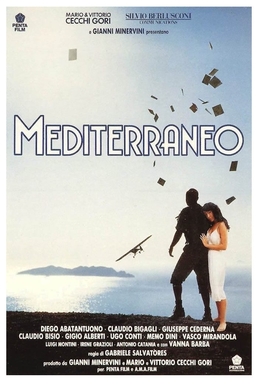
Mediterraneo is a 1991 Italian war comedy-drama film directed by Gabriele Salvatores and written by Enzo Monteleone. The film is set during World War II and concerns a group of Italian soldiers who become stranded on an island of the Italian Dodecanese in the Aegean Sea, and are left behind by the war. It won the Academy Award for Best Foreign Language Film in 1992.

Tango is a 1998 Argentine-Spanish musical drama film written and directed by Carlos Saura and starring Miguel Ángel Solá and Mía Maestro. It was photographed by cinematographer Vittorio Storaro.
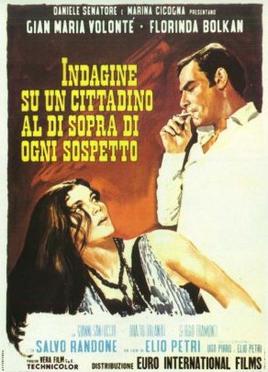
Investigation of a Citizen Above Suspicion is a 1970 Italian satirical crime thriller film directed by Elio Petri, starring Gian Maria Volonté and Florinda Bolkan. It is a psychological, black-humored satire on corruption in high office, telling the story of a top police officer who kills his mistress, and then tests whether the police would charge him for this crime. He begins manipulating the investigation by planting obvious clues while the other police officers ignore them, either intentionally or not.
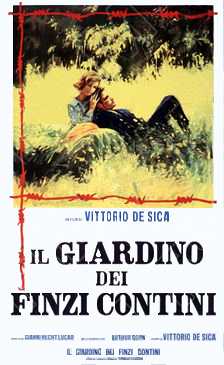
The Garden of the Finzi-Continis is a 1970 Italian historical drama war film directed by Vittorio De Sica. The screenplay by Ugo Pirro and Vittorio Bonicelli adapts Italian Jewish author Giorgio Bassani's 1962 semi-autobiographical novel, about the lives of an upper-class Jewish family in Ferrara during the Fascist era. The film stars Lino Capolicchio, Dominique Sanda, Helmut Berger, Romolo Valli, and Fabio Testi in his breakthrough role.

The Great War is a 1959 Italian comedy-drama war film directed by Mario Monicelli. It tells the story of an odd couple of army buddies in World War I; the movie, while played on a comedic register, does not hide from the viewer the horrors and grimness of trench warfare. Starring Alberto Sordi and Vittorio Gassman and produced by Dino De Laurentiis, the film won the Golden Lion at the Venice Film Festival. Its crew also included Danilo Donati (costumes) and Mario Garbuglia.

The Family is a 1987 Italian drama film directed by Ettore Scola and starring Vittorio Gassman, Fanny Ardant, Philippe Noiret, and Stefania Sandrelli. It was entered into the 1987 Cannes Film Festival. The film received an Academy Award nomination for Best Foreign Language Film at the 60th Academy Awards.

Three Brothers is a 1981 Italian film based on a work by Russian author Andrei Platonov. It was directed by Francesco Rosi and stars Philippe Noiret, Vittorio Mezzogiorno, Michele Placido and Charles Vanel.

Gomorrah is a 2008 Italian crime drama film directed by Matteo Garrone, based on the non-fiction book of the same name by Roberto Saviano, who also collaborated in the screenplay. It deals with the Casalesi clan, a crime syndicate within the Camorra — a traditional criminal organization based in Naples and Caserta, in the southern Italian region of Campania.
Lover's Grief over the Yellow River is a 1999 Chinese film directed by Feng Xiaoning. It was China's official Best Foreign Language Film submission at the 72nd Academy Awards, but did not receive a nomination. Feng considers it the second of his "War and Peace" (战争与和平) trilogy.

Macaroni is a 1985 Italian comedy-drama film directed by Ettore Scola. The film, starring Marcello Mastroianni and Jack Lemmon, was selected as the Italian entry for the Best Foreign Language Film at the 58th Academy Awards, ahead of Federico Fellini's Ginger and Fred, but was not accepted as a nominee.

Terraferma is a 2011 Italian drama film directed by Emanuele Crialese, who co-wrote the screenplay with Vittorio Moroni. The film chronicles the intensification of the refugee crisis in Insular Italy in the beginning of the 2010's.
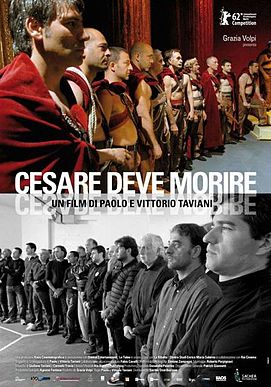
Caesar Must Die is a 2012 Italian drama film directed by Paolo and Vittorio Taviani. The film competed at the 62nd Berlin International Film Festival where it won the Golden Bear. The film is set in Rebibbia Prison, and follows convicts in their rehearsals ahead of a prison performance of Julius Caesar.

Of Horses and Men is a 2013 Icelandic drama film written and directed by Benedikt Erlingsson and produced by fellow director Friðrik Þór Friðriksson.

Don't Be Bad is a 2015 Italian drama film directed by Claudio Caligari. The film was selected as the Italian entry for the Best Foreign Language Film at the 88th Academy Awards but it was not nominated. It was the last film directed by Caligari: a few days after the end of the film editing, he died from a tumor.


















